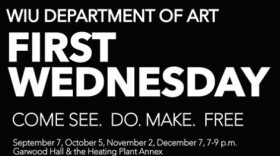On January 13th, in the basement of Spoon River College's Washington Street Campus, Adult Education Program Coordinator Cynthia Johnston patiently encouraged me as I struggled to read a paragraph aloud.
“Mark. And.” I paused, already frustrated two words in.
“Good,” Cynthia said.
“I don’t know the next word,” I said and sighed before sounding it out, “Cyn-th-i-a. Live. On. A. Lake. In. The. City.” The three sentences that followed required an intense, physical focus as I deciphered the words that were in front of me. I stopped and started, grappling with a skill that I had always, always taken for granted—reading. Reading has always been associated with pleasure, safety, sanctuary, and learning. But two weeks ago, for five minutes, I felt only frustration, and a burning embarrassment. Two friends I like and respect watched and listened as I struggled. I had just met Cynthia Johnston, but I didn’t want her to think I was stupid. My brain simply wouldn’t do what I needed it to do, not even by sheer force of will. When my paragraph was completed, I felt entirely spent and shaken.
According to a poster provided by Cynthia Johnston, “1 out of 5 adult Americans cannot read.” Take a moment with that. Consider how you use reading and writing every day. Consider the implications of not being able to read. According to Proliteracy, “More than 38 million adults in the United States cannot read, write, or do basic math above a third-grade level.” Low literacy rates are tied to poverty, high school dropout rates, can play a determining factor in literacy levels for children, have adverse health complications, and our correctional facilities are filled with inmates labeled as “low literacy.” Literacy is not only a basic skill, but it seems to me, a basic right, yet ProLiteracy: Member Statistical Report states:
A decline in federal and state funding in the past 10 years has resulted in programs serving only a fraction of the adults in need. Currently, two-thirds of adult education programs are struggling with long student waiting lists. At the present levels of public funding, less than 10 percent of adults in need are receiving services.
Illinois is experiencing cuts in this area due to lack of state funds, in very real ways that can be felt as close by as Carl Sandburg College’s Adult Education and Literacy Program in both Bushnell and Carthage. Spoon River College is committed to this important work, despite awaiting state funds, and they are to be commended. My small window of struggle was a powerful training exercise as part of SRC’s program to become a Literacy Tutor.

Literacy is intrinsically tied to every aspect of my life. I have made deep friendships over a shared love of a particular book. My friends and I are always discussing what we are reading, recommending novels, and passing well-loved books along. My vocation is the teaching of writing, and I feel most myself when I am writing. If my children ask me to read another chapter at bedtime, the answer is always yes. If they ask for one more book on their teetering library stack of books, the answer is (almost) always yes.
I was delighted when then President Obama conducted an interview in September 2015 with my favorite novelist and essayist, Marilynne Robinson, for The New York Review of Books. In the second installment of the interview, Former President Obama stated:
When I think about how I understand my role as citizen, setting aside being president, and the most important set of understandings that I bring to that position of citizen, the most important stuff I’ve learned I think I’ve learned from novels. It has to do with empathy. It has to do with being comfortable with the notion that the world is complicated and full of grays, but there’s still truth there to be found, and that you have to strive for that and work for that. And the notion that it’s possible to connect with some[one] else even though they’re very different from you.
The interview came to mind when listening to Former President Obama’s final address, which reminded me powerfully of the daily process of democracy, and our call as citizens to engage with the democratic process. To do what we can, where we can, for the betterment of all, despite the fact that it can involve exhaustive struggle. If you think that literacy is one of the foundations of being an active, engaged citizen, or that literacy empowers and opens life up in wondrous and practical ways, then please consider becoming a Literacy Tutor. Contact Cindi Johnston at 309-833-6038 or Cyndi.johnston@src.edu. Training is primarily web based, so you can do it at your pace and as your schedule allows. This service is provided at no charge to the student, and you will meet once or twice a week for one hour each session at a place arranged by SRC Literacy. SRC is providing an amazing resource, at no cost, that will enrich not just individuals and their families, but our collective community. Please, please consider joining me in supporting it.
Barbara Harroun is an Assistant Professor of English at Western Illinois University.
The opinions expressed are not necessarily those of the University or Tri States Public Radio. Diverse viewpoints are welcomed and encouraged.








